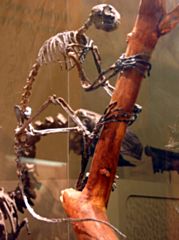Project 2610: G. F. Gunnell. 2002. Notharctine primates (Adapiformes) from the early to middle Eocene (Wasatchian–Bridgerian) of Wyoming: transitional species and the origins of Notharctus and Smilodectes. Journal of Human Evolution. 43 (3):353-380.
Abstract
Notharctine adapiform primates are an abundant element of early (Wasatchian) and middle (Bridgerian) Eocene faunal assemblages from the western interior of North America. Early Eocene notharctine samples are dominated byCantius with Pelycodus and Copelemur being much rarer and more restricted in their geographic distribution. Cantius is replaced in the middle Eocene by Notharctus and Smilodectes, both of which are common but less widespread, being best known from southwestern Wyoming. The origin of these two middle Eocene taxa has not been well understood, due to a lack of transitional Wasatchian–Bridgerian notharctine faunal samples or because known samples had not been adequately studied. Field work at South Pass in the Greater Green River Basin has produced a relatively large sample of earliest Bridgerian notharctines. Combining this sample with a large, but previously under-studied, sample of notharctines from the latest Wasatchian and earliest Bridgerian in the Wind River Basin has clarified the relationships among Notharctus,Smilodectes , and earlier occurring notharctines. Notharctus first appears in the latest Wasatchian (Wa7), represented by N. venticolus. Phylogenetic analysis supports a Notharctus clade that shares sister taxon status with Cantius nunienus and indicates that Notharctus arose through bifurcation of the lineage containing the last common ancestor of C. nunienus and Notharctus. The origins of Smilodectes are less clear. Phylogenetic analysis supports a clade consisting of Smilodectes and Copelemur, but the origins of both taxa are not established as yet. North American notharctines are typified by relatively low taxonomic diversity, but relatively high abundance and high dental morphological variation (disparity). These attributes are opposite to those of North American omomyids, reflecting differences in ecomorphospace between these two primate radiations.Read the article »
Article DOI: 10.1006/jhev.2002.0582
Project DOI: 10.7934/P2610, http://dx.doi.org/10.7934/P2610
| This project contains | Matrices |
|---|---|
Download Project SDD File | Total scored cells: 904 Total media associated with cells: 0 Total labels associated with cell media: 0 |
| Characters | |
| Total characters: 53 Total characters with associated media: 0 Total characters with media with labels: 0 Total character states: 150 Total character states with associated media: 0 Total character states with media with labels:0 Total unordered/ordered characters:53/0 |
Currently Viewing:
MorphoBank Project 2610
MorphoBank Project 2610
- Creation Date:
06 February 2017 - Publication Date:
21 February 2017 - Matrix downloads: 7

This research
supported by
Authors' Institutions ![]()
- University of Michigan
Members
| member name | taxa |
specimens |
media | chars | character
| cell scorings (scored, NPA, "-") | cell
| rules | ||||||
| MorphoBank Curator Project Administrator | 17 | 1 | 1 | 53 | 0 | 0 | 904 (904, 0, 0) | 0 | 0 | 0 | ||||
| Sharon Doyle Full membership | 0 | 0 | 0 | 0 | 0 | 0 | 0 (0, 0, 0) | 0 | 0 | 0 | ||||
| Gregg Gunnell Full membership | 0 | 0 | 0 | 0 | 0 | 0 | 0 (0, 0, 0) | 0 | 0 | 0 | ||||
Taxonomic Overview for Matrix 'M24463' (17 Taxa)
| taxon | unscored cells |
scored cells |
no cell support |
NPA cells |
"-" cells | cell images | labels on cell images |
member access |
| [1] † Teilhardina belgica Taxon name last Modified on 02/06/17 | 3 | 52 | 50 | 0 | 0 | 0 | 0 | 3 |
| [2] † Copelemur tutus Taxon name last Modified on 02/06/17 | 10 | 45 | 43 | 0 | 0 | 0 | 0 | 3 |
| [3] † Copelemur australotutus Taxon name last Modified on 02/06/17 | 0 | 53 | 53 | 0 | 0 | 0 | 0 | 3 |
| [4] † Copelemur praetutus Taxon name last Modified on 02/06/17 | 6 | 47 | 47 | 0 | 0 | 0 | 0 | 3 |
| [5] † Cantius abditus Taxon name last Modified on 02/06/17 | 1 | 53 | 52 | 0 | 0 | 0 | 0 | 3 |
| [6] † Cantius nunienus Taxon name last Modified on 02/06/17 | 0 | 63 | 53 | 0 | 0 | 0 | 0 | 3 |
| [7] † Cantius torresi Taxon name last Modified on 02/06/17 | 6 | 50 | 47 | 0 | 0 | 0 | 0 | 3 |
| [8] † Cantius ralstoni Taxon name last Modified on 02/06/17 | 1 | 55 | 52 | 0 | 0 | 0 | 0 | 3 |
| [9] † Cantius mckennai Taxon name last Modified on 02/06/17 | 1 | 56 | 52 | 0 | 0 | 0 | 0 | 3 |
| [10] † Cantius trigonodus Taxon name last Modified on 02/06/17 | 1 | 56 | 52 | 0 | 0 | 0 | 0 | 3 |
| [11] † Notharctus venticolus Taxon name last Modified on 02/06/17 | 0 | 67 | 53 | 0 | 0 | 0 | 0 | 3 |
| [12] † Notharctus robinsoni Taxon name last Modified on 02/06/17 | 1 | 55 | 52 | 0 | 0 | 0 | 0 | 3 |
| [13] † Notharctus tenebrosus Taxon name last Modified on 02/06/17 | 0 | 58 | 53 | 0 | 0 | 0 | 0 | 3 |
| [14] † Smilodectes gracilis Taxon name last Modified on 02/21/17 | 0 | 56 | 53 | 0 | 0 | 0 | 0 | 3 |
| [15] † Smilodectes mcgrewi Taxon name last Modified on 02/06/17 | 0 | 57 | 53 | 0 | 0 | 0 | 0 | 3 |
| [16] † Smilodectes sororis Taxon name last Modified on 02/06/17 | 13 | 43 | 40 | 0 | 0 | 0 | 0 | 3 |
| [17] † Pelycodus jarrovii Taxon name last Modified on 02/06/17 | 16 | 38 | 37 | 0 | 0 | 0 | 0 | 3 |
Project downloads 
| type | number of downloads | Individual items downloaded (where applicable) |
| Total downloads from project | 215 | |
| Project downloads | 208 | |
| Matrix downloads | 7 | Morphological character matrix (7 downloads); |

